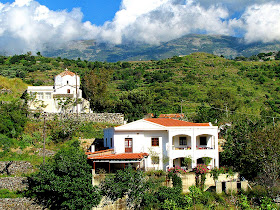 |
| Mount Atheras, the highest point on Ikaria |
I have written before about the Aegean island, Ikaria, the
place from which my parents and my eldest brother, Nick, immigrated to
Australia just before the Second World War. I first came to the island in April
1971, escorting my late mother who was returning to her ancestral home after an
absence of more than 30 years. Many changes had of course occurred during her
life away from family and friends in those intervening thirty years, and many
changes have occurred in the 33 years since I first returned to the island with
her.
Ikaria, and many of the Ikarians who live on the island,
have now joined the ranks of a very exclusive club reserved for just five
regions on the planet. These have become known as Blue Zones, from Dan
Buettner's book, "The Blue Zones: Lessons for Living Longer from people
who lived the longest."
 |
| Terraced hillsides and valleys make maximum use of the land |
Blue Zone is a concept used to identify a demographic and/or
geographic area of the world where people live measurably longer lives, typically
well into their 90s and beyond. The five regions identified and discussed by
Buettner in the book Blue Zones are:
- Sardinia, Italy.
- The islands of Okinawa, Japan.
- Loma Linda, California.
- Nicoya Peninsula, Costa Rica.
- Ikaria, Greece.
Residents of the first three places produce a high rate of
centenarians, suffer a fraction of the diseases that commonly kill people in
other parts of the developed world, and enjoy more healthy years of life.
Referring specifically to Ikaria, an April 2009 study on the
island uncovered the location with the highest percentage of 90 year-olds on
the planet - nearly 1 out of 3 people make it to their 90s. Furthermore,
according to the study, Ikarians "have about 20 percent lower rates of
cancer, 50 percent lower rates of heart disease and almost no dementia".
 |
| View across Kampos valley to St. Irene (Agia Irini) church |
I can personally vouch for the above statement. On this and
on previous visits to Ikaria, I have spoken to a 98 year old man who helped
carry my brother (then 18 months old), to the ship my mother was preparing to
board for her journey to Australia―just before the outbreak of war in 1939.
The people inhabiting Blue Zones share common lifestyle
characteristics that contribute to their longevity. These characteristics
include:
- Family – put ahead of other concerns
- Less smoking
- Semi-vegetarianism (except for the Sardinian diet, the majority of food consumed is derived from plants)
- Constant moderate physical activity – an inseparable part of life
- Social engagement – people of all ages are socially active and integrated into their communities
- Legumes – commonly consumed
- Geographical Area: All these "blue zones" are located near volcanoes which apparently increase the mineral content of the local water supplies.
There has been some speculation and claims that drinking
water high in mineral content, along with the consumption of fruits, vegetables
and vegetation irrigated with water rich in minerals may play a part in
increased health and life span. However, an ongoing debate as to whether or not
the mineral water component is a major reason for health and longevity in these
"blue areas" is yet to come up with a definitive decision.
 |
| A closer look at St. Irene (Agia Irini) church |
With regard to these shared characteristics, I can again
vouch for the presence of some of these on Ikaria. Family ties remain strong,
as do ties to the land with most families maintaining and producing a good
supply of their own fresh fruits and vegetables. Almost every family on the
island has their own grove or two of olive trees from which they source their
own oil and a good supply of olives for the table. Many have their own
vineyards from which they produce their own table wines, and many, like my
sister Irene, have several goats which provide milk for general use or which is
turned into homemade yoghurt or cheese. Of course, by producing their own
fruits and vegetables, wines, olive oil and olives, and milk products, the
Ikarians are by necessity, engaging in quite strenuous regular activity.
 |
| General view across the island |
Time will tell whether Ikaria will maintain its position in
the Blue Zone ranks. Unfortunately, many younger Ikarians are spurning the
hours of physical work required to maintain extensive gardens, olive groves and
vineyards, and the care of animals, in favour of a quick trip to local
supermarkets to buy their groceries and daily necessities.
Here is Dan Buettner speaking about Blue Zones at a TED
conference some years ago:
More Information
TED…
No comments:
Post a Comment
Your Comments, Thoughts and Feedback is encouraged.